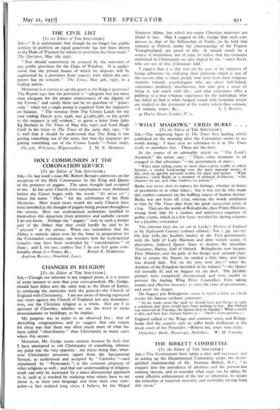CHANGES IN RELIGION [To the Editor of THE SPECTATOR.]
Sut,—Though not relevant to my original point, it is a matter of some interest to note that your correspondent, Mr. Gedge, ,should have fallen into the same trap as the Dean of Exeter, in confusing the particular with the general—the Church of England with Christianity. I am not aware of having expressed any views against the Church of England, nor any denomina- tion, nor the Christian religion as a whole. Nor am I as ignorant of Churches, whether we use the word to mean denominations or buildings, as he implies.
My purpose was to point to an observed fact : that of dwindling congregations, and to suggest that one reason for these was that there was often much more of what has been called " churchianity " than Christianity in many cases where this occurs.
Moreover, Mr. Gedge seems anxious because he feels that I have attempted to rob Christianity of something, whereas my point was the very opposite : my thesis being that, what- ever Christianity possesses (apart from the Sacramental System, as understood and accepted by " Catholics "—and repudiated by " Protestants ") is the common property of other religions as well ; and that our understanding of religious truth can only be increased by a many-dimensional approach to it, such as is reached by studying what others have to say about it, in their own language and from their own view- point—a fact realised long since, I believe, by the Mogul Emperor Akbar, but which too many Christian ministers are afraid to face. May I suggest to Mr. Gedge that such con- gresses as that of the Fellowship of Faiths (to be held this summer at Oxford, under the chairmanship of Sir Francis Younghusband) are proof of this. It should surely be a source of inspiration, not of pain, to realise that the treasures enshrined in Christianity are also shared by the " other flocks who are not of this (Christian) fold."
I suggest that it is this fear on the part of the ministry of losing adherents by widening their platform which is one of the reasons why so many people now turn from their religious
mentors towards psychologists who are often . half-baked, sometimes positively mischievous, but who give a sense of being in real touch with life ; and who sometimes offer a pathway to a true religious experience for the individual, who has failed to find it while hedged round with formulae which are studied to the detriment of the reality which they contain.
—I remain, yours, &c., L. J. BENDIT.
4r Harley Street, London, W. r.














































 Previous page
Previous page